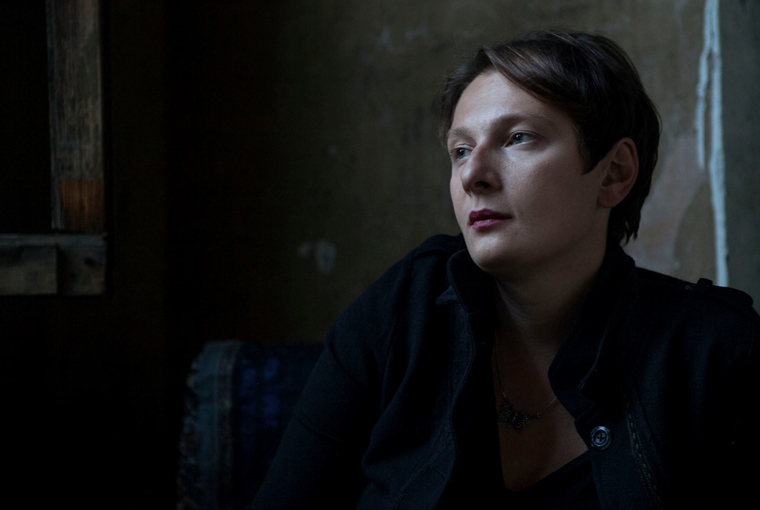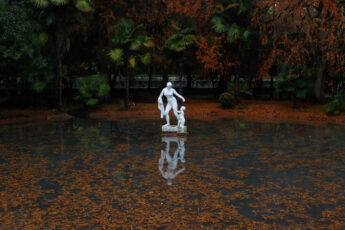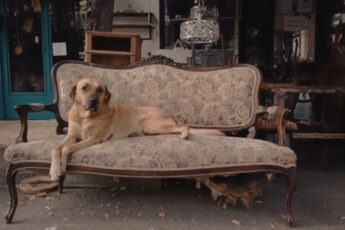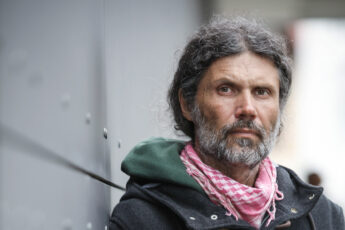
We met Anna Dziapshipa during the 2023 DOK Leipzig festival (8-15 October), where her most recent documentary screened in the Panorama: Central and Eastern Europe 2023 section. Dziapshipa shares the main idea behind her cinematic reflections on her Abkhaz identity. She also discusses the difficult filmmaking process, being an internally displaced person, and the narrow-minded preconceptions people have about borders and the people passing them.
How did the idea for Self-Portrait Along the Borderline develop? When did you know this was going to be a film?
It was when I went back to Abkhazia to find my home, and when I opened the door – which had been closed for 23 years. It opened up all these memories, of pain, childhood, and happiness, all together. Then I realized I have to make a story out of it. There’s something in it that not only concerns my personal biography and my own family, but really concerns the fates of many displaced people, families that have been separated by borders, especially nowadays with the wars and everything that’s happening in our world. It’s quite obvious and important to talk about that, how borders are dividing families and people. They’re dividing lives. So it was an important thing for me to talk about, since my family was also divided by a border.
So you had actually already been to the house before you started filming.
Yes. I went there in 2013 for the first time since the war in the 1990s. The first trip was a shock for me because it was difficult to get a visa – I have a Georgian passport, though my surname is Abkhaz. Since I was living in Georgia, it was impossible to get a visa. At some point I suddenly got it, unexpectedly, so I just went there for several days. I wasn’t really prepared, I didn’t even check the weather. It was so weird. It felt like it wasn’t a real territory, but something dreamlike. So I went there to find my house, and, you know, when you go to a place after childhood, everything is a bit different. You’re like Alice in Wonderland, bigger in a smaller place somehow. The dimensions are so different and so strange. I couldn’t find the house in this new dimension, in this new context, so it took some time to understand how it was structured and to compare it to my memory. I found the house after the first trip, and I started to think about what I should do with this building that’s been closed for 23 years. There were so many stories kept inside it.
What’s happening with the house now? Are you still able to go back?
The house is decaying. It’s dying because nobody has lived there for 25 years now, so it’s just getting really bad. It’s as if it’s stopped belonging to humans, somehow, and now it belongs to nature. You see vegetation growing inside and inhabiting the space, and there are all these spiders that are living in the house. There are also rats. It doesn’t really have an anthropocentric view anymore, there’s a view from a different perspective. So the house is just left to different species and vegetation. There is no other way – my uncle has died, my grandparents died. My father died. It’s difficult because of the border, it’s not easy to get permission to go there. You need to stay there for some time, maybe over the summer, to get the house working again, to breathe life into it. But still, there are so many people who love their houses but don’t have the possibility to see them, so in that sense I was lucky to understand how it is to feel this place and to just leave it as it is. Because at this point there is nothing else to be done about it.
So the spiders in the archival footage were inspired by real spiders from the house.
Generally, yes, because I really like this image. I mean, they had their own private hiding place, they were making their own borders inside the house with huge spider webs. It was beautiful and scary at the same time. And then I started to delve into understanding how they live. I met this amazing guy who knows everything about spiders, and he’s really passionate about them. It’s a Facebook group called Wild Georgia, and if someone has a question about spiders, they can upload a photo and he knows everything. He knows the species, the Latin and the international names. He knows their story and will say: “Don’t touch them, leave them to have their own life”. Things like that. I was really astonished with his passion for spiders, and then I kept making connections. So I started to talk with him and he gave me a book by the first arachnologist woman in Georgia, who was interested in local spiders and their patterns of migration. And at some point, the book appeared very political, because it had this geopolitical migration aspect, resorting to words like invasion. You have this symbolic meaning of how these spiders move geographically, it was really weird and interesting. And she also explains their lives, and at some point, I was struck by this phrase saying that for spiders a cobweb is simultaneously a trap and a home. It was something that I knew, but when I read it, I saw the relevance. And then I started to re-enact these phrases from the book with my friend, to record them in the manner of a Soviet scientist. I looked for films about spiders, but there was nothing, so I recreated the archival material together with my friend.
How did your approach to working with archival material come about?
It’s also kind of connected with the memory thing, because the building of the archive in Abkhazia was burned down in the 90s, so all these memories were erased in a way, they evaporated during the war. The people living there were left without any memories. So archives became very important when working on the film, because at some point I fundraised and with my colleagues and friends we made these virtual archives of Abkhazia. Not all, but some of the material was located in the central archives during Soviet times, in Tbilisi, the Georgian capital. So we found some material that touched on Abkhaz issues and topics. I tried to collect private archives, because many IDPs who leave their place behind because of war realize they have to leave their most precious things behind, and often the most precious thing are family albums. So they lose their memories. Of course, they lose much more sometimes, like family members, but once they survive, they miss these kinds of tiny details too. They are like memories. And memories are so important because they’re the only thing left.
At the moment of escaping, you don’t really think about that, but I listened to a lot of oral histories about displaced people, and they talked a lot about archives, pictures, images, visuals. So that’s when I began with the research about the archives. It was always my passion to work with archives, and in my short films I had already experimented with archival footage. But in this case, it was like I wanted to understand what lies beneath all the propaganda images. Because they are strange films that are filled with joy but at some point, you know, there’s a kind of sadness. There is something beneath it. The authors who were making these films would use music with this kind of irony or censorship, and they would make some interesting things that are beneath these images somehow. So that’s why I zoom into the archives and try and deconstruct them. I’m trying to understand what is beneath them and how I can decolonize them and how I can make them subjective. How can I make them my own, in a way that tells my story and not the general story?
What was your approach to the footage that you shot yourself, and how did you handle the relationship to the archival materials?
For Georgians – not only for Georgians, but for the entire Soviet Union – Abkhazia was like the Soviet Riviera. People talking about Abkhazia would describe it as having nice weather, nice beaches. They’d describe it with beautiful postcard images, talking about romance and love stories and everything that happens in the summer. But nobody would ever talk about the people. And when I went to Abkhazia and I started to film and research, I was thinking a lot about how I should film that. How should I film it so that I could bring the postcard images without them being these happy, beautiful postcards? There would be something disturbing in them, something wrong with them. There’s something else besides these postcards. And for me it was very difficult to film because I wanted to understand how to avoid exoticizing this beautiful place, how to do something different. In a way, I drew inspiration from the places that I had seen in the archives, and also the places that I visited as a child when I spent my summer holidays there with my family. So the approach to filming was different in different cases, for example in terms of how to film the house, and how to place this place that used to be so big but is now not very big anymore, so I needed to have a different perspective on everything. So I was constantly questioning the shooting process. But at some point, I realized I was disconnecting myself from the images. I was filming with a camera person, so it was always detached somehow, distant, and I couldn’t really get close to some places and then I never dared to even work with the people there. There were so many years of heartache, so many traumas, problems, conflicts, and unresolved issues that I couldn’t really touch on, so I decided to be distant and to take a really personal perspective on how I see this place, which was very much connected to my family memory.
The film doesn’t really get into politics or cultural and geopolitical specifics. Were you ever pressured into giving more context or more background information, or were you sure from the beginning that this would be about your personal experience and your own identity?
There was pressure, of course, but I started with the general story. If I start to talk about Abkhazia and then I face the question of Abkhazia’s history and how it all happened, it’s really confusing. It’s such a difficult, wide topic, because some conflicts in the world, especially now, are so black and white. But this is an ethnic conflict that touches on so many issues and there are so many perspectives, so it’s very difficult to talk about it.
This is especially true for me as I have this triple position, the position of an Abkhazian, the position of someone living in Georgia, and the position of an IDP, of the displaced, who have a completely different perspective. So how can I merge all these perspectives? It’s difficult. So that’s why I wanted the film to be a visual reflection of those things. At some point I was hesitant about whether to have my voice over, but then it became too abstract and too general. So my editor and I decided to add that voice, to have somebody who would talk about this main biographical link in a very dry manner without overdoing it. And a lot of people connect to it. Even though they don’t know this story, most people know the story of borders, of displaced peoples. The story of identity and home is general, so everybody can generalize for themselves. You don’t need to bring up those specific details. If anybody wants to know more, they can Google everything they want to know.
I think the way you discuss the foreignness of your surname is something a lot of people with mixed identities can relate to, for example.
Yeah, I remember that sometimes I would use my mother’s name when I was a kid, during the war, because it was a very nationalistic period in Georgia. Coincidentally, several days ago I heard from a friend of my uncle that he was not allowed to enter Georgia because this guy on the border saw his name and said, “You’re Abkhazian”. So they didn’t let him in. These stories were hidden from me because my family tried to preserve this shell of a nice life in Tbilisi during the war. Of course, it was a difficult reality to avoid because people came over, my grandfather came over, so you got to hear about some stories. But they tried to hide the stories of xenophobia and people being racist towards us as Abkhazians. A friend told me that during this heavily nationalistic period in the 90s, my mother and father erased the names of all people in our hallway so they wouldn’t attract too much attention. And as I said, I was also using my mother’s Georgian surname, because people wouldn’t pay attention to it, so in a way I was hiding it. But I never wanted to change it, I felt ashamed for a while because of that. Sometimes you got positive discrimination because of the name, if you were in a group of friends, you would get a lot of attention, especially from men, and that was weird. And sometimes you don’t want to get attention because of something you can’t control, like your name. But now my name is important to me. It’s really become a part of who I am, and I think I’m privileged to have this perspective from the periphery.
And how has the reaction in Georgia been?
I had the Georgian premiere in September, and it was at a festival so there was a nice festival audience generally speaking. But then I got a comment from one woman who attended the screening, and she wrote a big post on Facebook saying that the film was nice and interesting, but that it’s a documentary and that it should include the facts. She thought I had a very pro-Abkhaz position, so she wasn’t very happy about that. But it’s fine, I was expecting worse, because it’s a very difficult subject to talk about in Georgia. It’s still unprocessed pain and unprocessed conflict. The premiere was in Tbilisi, but maybe there will be harsher discussions at future screenings, especially given the current context. But I’m ready for that and I’m looking forward to it. It’s important.
I recently heard that when Russians who have relocated to Georgia because of the war on Ukraine want to enter a bar or go to a restaurant, they are asked to sign documents not only declaring their opposition to Putin, but also acknowledging Abkhazia as part of Georgia.
The Russian perspective is also different, because of the war with Georgia in 2008. I see their approach as being very colonial. Of course, making Russians sign these kinds of documents is really extreme, and I don’t have any problem overall with people living somewhere so that they are not obliged to take part in a war. I don’t want to generalize, but we have a very colonial, imperialist past with Russia, which makes it complicated. But recognizing Abkhazia as Georgia is such a big part of the Georgian narrative, and if you ever dare to speak about the independence of Abkhazia, it’s like you’re a traitor. There was a period when I was myself considered a traitor, I was being called an agent of Putin. People immediately label you if your position is different or challenging. It’s a very complicated context with very complex positions. Sometimes when you mobilize all these different positions and try to talk about them, then you are an enemy of the nation.
Final question – how did the reference to Frida Kahlo come about?
Actually, I was editing the film and then I went to a residency in Texas and spent a month there. I decided to explore the borders there, because the borders are really important, especially the border between Texas and Mexico. So I went there and I crossed the border from Texas to Mexico, and I started to research the border poetry, which is a very active movement there. And I realized that even though it’s a thousand miles away, the borders have more or less the same stories and the same meanings. So I was researching and reading a lot, and I loved Frida Kahlo, especially the way she exposes all her personal pain, bodily and metaphorically. So I loved this idea of how women can bear ideas on their bodies and expose their bodies to understand meaning, so that’s why she was an important woman in the history of art for me. So when I found this picture of her standing on the border between Mexico and the USA, incorporating all her life being on these two sides, I thought it would be a good reference. It’s important and it conveys the meaning that I wanted to convey. I really love references, I think it’s important to appreciate them and to try to be as good as that which you reference is.
Thank you for the interview.




Leave a Comment